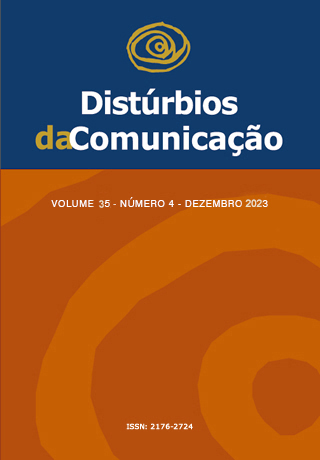Sinais clínicos da migrânea vestibular em adolescentes
DOI:
https://doi.org/10.23925/2176-2724.2023v35i4e63695Palavras-chave:
Transtornos de Enxaqueca, Adolescente, Transtornos da Cefaléia PrimáriosResumo
Introdução: A migrânea é um tipo de cefaleia primária incapacitante que, quando associada a crises de vertigem, configura-se migrânea vestibular. Objetivo: Verificar quais as principais manifestações clínicas da migrânea vestibular em adolescentes. Métodos: Trata-se de uma revisão integrativa da literatura, cujas buscas foram executadas nas bases de dados eletrônicas PubMed/Medline, Scientific Electronic Library Online (SciELO), e Portal da Biblioteca Virtual em Saúde (BVS), em junho de 2022. Foram incluídas publicações entre o ano 2012 e o mês de junho de 2022; estudos observacionais e ensaios clínicos envolvendo seres humanos, nos quais o objetivo fosse avaliar indivíduos com idades entre 12 e 19 anos com diagnóstico de migrânea vestibular e verificar suas principais manifestações clínicas nessa população. Resultados: Todos os estudos mencionaram um maior percentual de meninas nas amostras, porém a diferença entre os sexos para os diferentes diagnósticos não foi avaliada em todas as pesquisas. Conclusão: Verificou-se, com a presente revisão, que as manifestações clínicas da migrânea na adolescência são semelhantes às da população adulta.
Downloads
Referências
Langhagen T, Albers L, Heinen F, Straube A, Filippopulos F, Landgraf MN et al. Period Prevalence of Dizziness and Vertigo in Adolescents. PLoS One. 2015; 10(9): e0136512. doi:10.1371/journal.pone.0136512
Filippopulos FM, Albers L, Straube A, Gerstl L, Blum B, Langhagen T, et al. Vertigo and dizziness in adolescents: Risk factors and their population attributable risk. PLoS One. 2017; 12(11): e0187819. https://doi.org/10.1371/journal.pone.0187819
Niemensivu R, Pyykkö I, Wiener-Vacher SR, Kentala E. Vertigo and balance problems in children—An epidemiologic study in Finland. Int J Pediatr Otorhinolaryngol. 2006; 70(2): 259–65.
Duarte JA, Leão EM, Fragano DS, Marquez GJ, Pires APB de Á, Silva MLS, et al. Vestibular Syndromes in Childhood and Adolescence. Int Arch Otorhinolaryngol. 2020; 24(4): e477–81.
Ganança FF, Silva RC, Morganti L, Salmito MC. Vertigem central. In: Piltcher OB, Costa SS, Maahs GS, Kuhl G (orgs.). Rotinas em otorrinolaringologia. Porto Alegre: Artmed; 2015. p. 134-41.
Strupp M, Brandt T, Huppert D, Grill E. Prevalence of motion sickness in various vestibular disorders: a study on 749 patients. J Neurol. 2018; 265(Suppl 1): 95–7.
Sociedade Internacional de Cefaleia. Classificação Internacional das Cefaleias. 3ª ed. São Paulo: OmniFarma; 2019.
Woldeamanuel YW, Cowan RP. Migraine affects 1 in 10 people worldwide featuring recent rise: A systematic review and meta-analysis of community-based studies involving 6 million participants. J Neurol Sci. 2017; 372: 307–15.
Souza MT, Silva MD, Carvalho R. Integrative review: what is it? How to do it? Einstein. 2010; 8(1): 102–6.
Blaschek A, Decke S, Albers L, Schroeder AS, Lehmann S, Straube A, et al. Self-reported neck pain is associated with migraine but not with tension-type headache in adolescents. Cephalalgia. 2014; 34(11): 895–903.
Aksu GG, Kayar O, Tufan AE, Kütük MÖ, Sucu DH, Taşdelen B, et al. Early maladaptive schemas differing according to sex may contribute to migraine among the youth. Brain Dev. 2022; 44(7): 427–37.
Landgraf MN, von Kries R, Heinen F, Langhagen T, Straube A, Albers L. Self-reported neck and shoulder pain in adolescents is associated with episodic and chronic migraine. Cephalalgia. 2016; 36(8): 807–11.
Langhagen T, Lehrer N, Borggraefe I, Heinen F, Jahn K. Vestibular Migraine in Children and Adolescents: Clinical Findings and Laboratory Tests. Front Neurol. 2015; 5: 292.
Bernardo AAO, Medeiros FL, Rocha-Filho PAS. Osmophobia and Odor-Triggered Headaches in Children and Adolescents: Prevalence, Associated Factors, and Importance in the Diagnosis of Migraine. Headache. 2020; 60(5): 954–66.
Vetvik KG, MacGregor EA. Sex differences in the epidemiology, clinical features, and pathophysiology of migraine. Lancet Neurol. 2017; 16(1): 76–87.
Morganti LOG, Salmito MC, Duarte JA, Bezerra KC, Simões JC, Ganança FF. Vestibular migraine: clinical and epidemiological aspects. Braz J Otorhinolaryngol. 2016; 82(4): 397–402.
Peters GL. Migraine overview and summary of current and emerging treatment options. Am J Manag Care. 2019; 25(2 Suppl): S23–34.
Charles A. The pathophysiology of migraine: implications for clinical management. Lancet Neurol. 2018;17(2):174–82.
Goadsby PJ, Holland PR. An Update: Pathophysiology of Migraine. Neurol Clin. 2019; 37(4): 651–71.
Goadsby PJ, Holland PR, Martins-Oliveira M, Hoffmann J, Schankin C, Akerman S. Pathophysiology of Migraine: A Disorder of Sensory Processing. Physiol Rev. 2017; 97(2): 553–622.
Russo A, Bruno A, Trojsi F, Tessitore A, Tedeschi G. Lifestyle Factors and Migraine in Childhood. Curr Pain Headache Rep. 2016; 20(2): 9.
Van de Berg R, Widdershoven J, Bisdorff A, Evers S, Wiener-Vacher S, Cushing SL, et al. Vestibular Migraine of Childhood and Recurrent Vertigo of Childhood: Diagnostic criteria Consensus document of the Committee for the Classification of Vestibular Disorders of the Bárány Society and the International Headache Society. J Vestib Res. 2021; 31(1): 1–9.
Downloads
Publicado
Edição
Seção
Licença
Copyright (c) 2024 Viviann Magalhães Silva Borges, Camila Franciozi, Rebeca Cardona Santa Helena, Cassiele Fontoura Moraes, Pricila Sleifer

Este trabalho está licenciado sob uma licença Creative Commons Attribution 4.0 International License.









